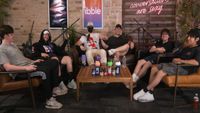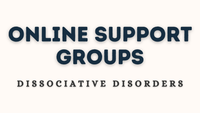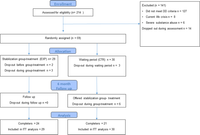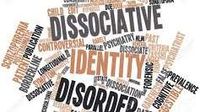Explore web search results related to this domain and discover relevant information.
Online support groups for trauma, dissociative disorders, Loved Ones, and DID & T.I.A.R Addiction Recovery, with Multiplied By One Org
Multiplied By One Org is an international nonprofit offering online support groups for CPTSD, dissociative disorders, and Loved Ones of Dissociative Identity Disorder systems. Groups combine peer and qualified support in an environment conducive to self-expression, coping skills, and a safe space to relate. ... DID & T.I.A.R.Group video calls are scheduled via a private network where chats and forums also allow members to connect throughout the week within their categories. These are peer support groups and are not therapy, nor are they a replacement for therapy. Learn more ABOUT DID & Trauma-Informed Addiction Recovery (T.I.A.R), or find additional group details by visiting our Information Center.Category groupings covered under one or different subscriptions are: ... Applicants must be aged 18 and up. Replies to applications can take a few weeks. Due to high demand, the DID/OSDD category is temporarily waitlisted while we build the capacity to provide further support.Some group lists may find around 15 in average attendance, including the hosts, while other lists are still growing. When a specific group grows enough, an additional day is added to that category. The Loved Ones of DID systems group is for all contexts of loved ones.


Lady Gaga seems to believe her college classmates actually created a Facebook group called ‘Stefani Germanotta, you will never be famous.’ But often that screenshot is thought of as a myth. Did this group really exist?
Perhaps the most parroted quote online is that the Facebook Groups feature was introduced in October 2010, well into Gaga already being famous, so the group couldn’t be real. However, groups (like the above pro-Gaga one) did exist for colleges at the time. Still, the screenshot doesn’t appear to be in the 2005 Facebook style; it looks much more like the 2010 style, when Groups launched to the public.“This is why you can’t give up when people doubt you or put you down — gotta keep going.” A deeply inspiring message! So inspiring, in fact, that a bunch of publications have covered the comment. But that group’s veracity has always been questionable, and the online position seems to have shifted against the screenshot being real in recent years. Did it really exist?“Stefani Germanotta, you will never be famous” is officially famous.Currently, there are multiple Facebook groups called “Stefani Germanotta, you will never be famous,” but all appear to be run by Gaga fans, were created well after Gaga was already famous, and were likely created in response to the meme already circulating. There is another group, created in 2005, with the name “Stefani Germanotta Is Going to Be Famous and I Am Going to Be Able to Say I Knew Her When …” that is still up that could have been created in response to the screenshotted group.

Group Discussions (GDs) may look like casual banter over a topic, but make no mistake—recruiters and panelists are dissecting your every move. They’re not just hearing what you’re saying. They’re scanning how you say it, why you said it, and how others reacted when you did.
What is a group discussion and how can you ace it? Explore the formats, importance, and best strategies to stand out in any group setting.Group discussions may seem more like an informal round of conversations, but they are a structured assessment of how well you can express yourself, your thoughts, listen to others, and contribute to a common goal.Many organizations use group discussions to assess how well a candidate works with others. Someone who constantly interrupts or refuses to acknowledge opposing views is likely to perform poorly in team settings.If you have ever applied for a competitive college program or a job with a reputable employer, you have definitely come across something called group discussion.
New Landscape’s monthly meetings began in November, 2004. We are a peer-led support group for men and women who have DID/MPD or another dissociative disorder, who are in the process of re-claiming self and life, and who would like to share experiences, thoughts, and feelings with peers.
New Landscape’s monthly meetings began in November, 2004. We are a peer-led support group for men and women who have DID/MPD or another dissociative disorder, who are in the process of re-claiming self and life, and who would like to share experiences, thoughts, and feelings with peers.New Landscape is not a group therapy session, it is not a 12-step program, and it is not a study group. Our sole purpose is to provide a place where peers can share their experiences in a safe, non-judgmental environment. You can be heard and recognized for who you are, validated just by being listened to and understood. You can talk about things you might not be able to share with non-DID/MPD people.

The Group is an American YouTube group made up of five content creators who are mostly based in Austin, Texas. They have become popular through their comedic Discord videos, and more recently, vlog-type content as well. They also host a podcast known as The Group Chat.
The Group is an American YouTube group made up of five content creators who are mostly based in Austin, Texas. They have become popular through their comedic Discord videos, and more recently, vlog-type content as well. They also host a podcast known as The Group Chat. It premiered on March 4...In early 2020, Grunk reached out to Isaac, saying he could get them into SMPEarth. This is where the group would meet Tanner.It is not exactly clear how the group met Yumi, though he began appearing in Isaac's videos in mid to late 2020, making him the last member to join.In 2022, they made the group official by starting The Group Chat podcast with the help of Gamersupps.

Online support groups for trauma, dissociative disorders, Loved Ones, and DID & T.I.A.R Addiction Recovery, with Multiplied By One Org
Multiplied By One Org is an international nonprofit offering online support groups for CPTSD, dissociative disorders, and Loved Ones of Dissociative Identity Disorder systems. Groups combine peer and qualified support in an environment conducive to self-expression, coping skills, and a safe space to relate. ... DID & T.I.A.R.Group video calls are scheduled via a private network where chats and forums also allow members to connect throughout the week within their categories. These are peer support groups and are not therapy, nor are they a replacement for therapy. Learn more ABOUT DID & Trauma-Informed Addiction Recovery (T.I.A.R), or find additional group details by visiting our Information Center.Category groupings covered under one or different subscriptions are: ... Applicants must be aged 18 and up. Replies to applications can take a few weeks. Due to high demand, the DID/OSDD category is temporarily waitlisted while we build the capacity to provide further support.Some group lists may find around 15 in average attendance, including the hosts, while other lists are still growing. When a specific group grows enough, an additional day is added to that category. The Loved Ones of DID systems group is for all contexts of loved ones.
DID Group is a partner for medium-sized companies in the industrial services sector focused on the rental of forklift trucks, truck-mounted cranes and aerial work platforms.
A globally active investor

Conclusion In the first randomized controlled trial for the treatment of complex dissociative disorders, stabilizing group treatment did not produce immediate superior outcomes. Treatment was shown to be associated with improvements in psychological functioning.
Background Patients with complex dissociative disorders (CDD) report high levels of childhood- abuse experiences, clinical comorbidity, functional impairment, and treatment utilization. Although a few naturalistic studies indicate that these patients can benefit from psychotherapy, no randomized controlled trials have been reported with this patient-group.At present, no evidence-based guidelines for the treatment of DID exist and very few clinical studies on this patient group have been published. Practice-based guidelines developed by the International Society for the Study of Trauma and Dissociation (ISSTD) [12] recommend a phased-based approach, with three stages.The effect of time was significant (t = 2.6, p < .05), but the interaction between time and condition was not significant (t = 1.6, p = .12), meaning that the model estimated that the patients improved from the start of therapy to the end of follow-up, but that the two groups did not differ in their development over time (see also Table 4).There was also a significant reduction in PTSD scores and general psychopathology in the control condition with medium effect-sizes, primarily related to symptom reductions during the follow-up phase. Other outcome measures did not show significant changes from pre-treatment to follow-up in either group (Table 5).
DISSOCIATIVE IDENTITY DISORDER SUPPORT GROUP GUIDELINES This peer support group is open to anyone with DID OR OSDD. Dissociative Identity Disorder is characterized by the presence of two or more distinct personality states. This group is not a therapy group or crisis intervention.
DISSOCIATIVE IDENTITY DISORDER SUPPORT GROUP GUIDELINES This peer support group is open to anyone with DID OR OSDD. Dissociative Identity Disorder is characterized by the presence of two or more distinct personality states. This group is not a therapy group or crisis intervention.DID hangout. No tough topics. Hang out and get to know one another! Bring a coffee or a drink and get to know others. RSVP for room number ... Group open to new members.’please messagege for more info.If you are warned by the moderator and the guideline is broken again, you will be removed from the meeting. Leaders will follow up with you once the meeting ends to review guidelines and ensure we’re good for future meetings. 1. Be on time to group for the respect of other members.If you are late, a moderator will direct message you and ask that you wait to share. 2. Moderators will lead a safe place at the beginning and end of group time. The last 10 minutes will be acknowledging system containment. 3. Confidentiality is essential. We ask all members to respect and protect the group’s privacy.

Today’s healthcare marketing ... of unexpected opportunities, challenging conventional thinking, and bringing a fresh perspective. At DiD, part of the Lucid Group, bringing healthcare innovations to life is personal....
DiD Agency | 8,125 followers on LinkedIn. Today’s healthcare marketing landscape is more complex and challenging than ever—the “standard” playbook no longer guarantees success. Lucid is purpose-built to help you make the most of unexpected opportunities, challenging conventional thinking, and bringing a fresh perspective.Today’s healthcare marketing landscape is more complex and challenging than ever—the “standard” playbook no longer guarantees success. Lucid is purpose-built to help you make the most of unexpected opportunities, challenging conventional thinking, and bringing a fresh perspective. At DiD, part of the Lucid Group, bringing healthcare innovations to life is personal.To provide a transparent view into our recruitment process, below are a few ways to ensure you’re connecting with our team at DiD: ✔ Verify the LinkedIn Profile: DiD/Lucid’s legitimate Talent Acquisition and People team members have verified LinkedIn profiles with the DiD or Lucid Group logo, detailed professional histories, and endorsements.This commitment is enshrined in our group wide inclusion policy and is part of our vision to embed equity into everything we do. #BHM #blackhistorymonth ... As we celebrate Martin Luther King Day in the United States today, Camille Johnson from DiD shares what this important day means to her...


Groups are a small version of a course and used as a collaborative tool where a minimum of two students can work together on group projects and assignments. 00:07: What are groups? 00:09: Instructors can create groups for students to collaborate on group assignments Pages, 00:13: collaborations ...
Did you mean: Community · Canvas · Canvas LMS · Canvas Basics Guide · What are Groups? Options · Subscribe to RSS Feed · Bookmark · Subscribe · Printer Friendly Page · Report Inappropriate Content · Groups are a small version of a course and used as a collaborative tool where a minimum of two students can work together on group projects and assignments.Groups are a small version of a course and used as a collaborative tool where a minimum of two students can work together on group projects and assignments. 00:07: What are groups? 00:09: Instructors can create groups for students to collaborate on group assignments Pages, 00:13: collaborations and...Groups are a small version of a course and used as a collaborative tool where a minimum of two students can work together on group projects and - 16Expand and collapse, subgroups move 00:54: students into different subgroups and create group collaborations. 01:00: As an instructor create groups to Set up student group 01:04: configurations at the course level for assignments and in-class work. 01:07: Both graded and ungraded, facilitate semester long projects, 01:12: so that students can communicate and iterate on documents together.
The standard Difference-in-Differences (DID) setup involves two periods and two groups -- a treated group and untreated group. Many applications of DID methods involve more than two periods and have individuals that are treated at different points in time. This package contains tools for computing ...
The standard Difference-in-Differences (DID) setup involves two periods and two groups -- a treated group and untreated group. Many applications of DID methods involve more than two periods and have individuals that are treated at different points in time. This package contains tools for computing average treatment effect parameters in Difference in Differences setups with more than two periods and with variation in treatment timing using the methods developed in Callaway and Sant'Anna (2021) .The did package contains tools for computing average treatment effect parameters in a Difference-in-Differences setup allowing for ... Treatment effect heterogeneity (i.e, the effect of participating in the treatment can vary across units and exhibit potentially complex dynamics, selection into treatment, or time effects) The parallel trends assumption holds only after conditioning on covariates · The main parameters are group-time average treatment effects.Group-time average treatment effects are also natural building blocks for more aggregated treatment effect parameters such as overall treatment effects or event-study-type estimands. There has been some recent work on DiD with multiple time periods.Although in the current example it is pretty easy to directly interpret the group-time average treatment effects, there are many cases where it is convenient to aggregate the group-time average treatment effects into a small number of parameters. A main type of aggregation is into an event study plot. To make an event study plot in the did package, one can use the aggte function

75K subscribers in the DID community. A solace for those navigating Dissociative Disorders, as well as those offering care and understanding to loved…
We received some intake forms for the Multiplied By One Org support groups that noted this thread. One of the emails bounced, as it probably had a typo. If whoever had an email starting with id. then reach out to the email on the org contact page so we can get in touch with you. ✨ ... Welcome to r/DID!Adult Children Of Alcoholics (ACOA, often shortened to ACA) is a support group for survivors of childhood trauma. The name and purpose have been expanded to include other childhood trauma, but the acronym has remained. It’s a 12 step program ( awaits thrown tomatos 🙂), but the steps have been very radically reworked into something that’s not actually self-abusive. I dunno, we got a lot of value out of it. It’s not DID specific, it’s about dealing with the long term effects of childhood trauma…Honestly, this is probably the best support group you will find online.Multiplied by One has support groups on Zoom.
However, false memory syndrome ... further describe the False Memory Syndrome Foundation as an advocacy group that has distorted and misrepresented memory research. A review of recent research into DID found not one empirical study into the sociocognitive model in the 2011-2021 ...
However, false memory syndrome per se is not regarded by mental health experts as a valid diagnosis, and has been described as "a non-psychological term originated by a private foundation whose stated purpose is to support accused parents," and critics argue that the concept has no empirical support, and further describe the False Memory Syndrome Foundation as an advocacy group that has distorted and misrepresented memory research. A review of recent research into DID found not one empirical study into the sociocognitive model in the 2011-2021 period, identifying the model as "a source of unresolved criticism of the trauma model", not an empirical hypothesis in its own right.No studies have looked for children with dissociative identity disorder in the general population, and the single study that attempted to look for children with dissociative identity disorder not already in therapy did so by examining siblings of those already in therapy for dissociative identity disorder. An analysis of the diagnosis of children reported in scientific publications, 44 case studies of single patients were found to be evenly distributed (i.e., each case study was reported by a different author), but in articles regarding groups of patients, four researchers were responsible for the majority of the reports.Usually on our anorexia nervosa floor, patients who entered with MPD [multiple personality disorder] cease discussing their alters within a few days and often report that after a week or two of recovering their body weight and attending group therapy tied to their eating disorder, the ideas and preoccupations with their “alters” gradually vanished from their thinking. According to a 2014 review, such views are based on anecdotal or non-peer-reviewed findings. In controlled studies, non-specialised treatment that did not address dissociative self-states did not substantially improve DID symptoms, though there may be improvement in patients' other conditions.Little is known about prognosis of untreated DID. Symptoms commonly wax and wane over time. Patients with mainly dissociative and post-traumatic symptoms face a better prognosis than those with comorbid disorders or those still in contact with abusers, and the latter groups often face a lengthier and more difficult treatment course.A paper published in 2022 in the journal Comprehensive Psychiatry described how prolonged social media use, especially on video-sharing platforms including TikTok, has exposed young people, largely adolescent females, a core user group of TikTok, to a growing number of content creators making videos about their self-diagnosed disorders. "An increasing number of reports from the US, UK, Germany, Canada, and Australia have noted an increase in functional tic-like behaviors before and during the COVID-19 pandemic, coinciding with an increase in social media content related to[...]dissociative identity disorder." Authors noted that such cases of self-diagnosed DID (amongst other conditions) often differ from clinically defined symptoms of the disorder, creating the possibility of malingering, and potential negative impacts on those with clinically diagnosed DID seeking integrative therapy.
EMDR can be an adjunctive/add-on ... complex posttraumatic disorders. Group Therapy: Group therapy can be helpful for the stabilization of individuals with DID if they are in a group dedicated to patients with this diagnosis, and the group is facilitated by practitioners that ...
EMDR can be an adjunctive/add-on treatment if the therapist has full training in EMDR and has specialized training in its use in DID and other complex posttraumatic disorders. Group Therapy: Group therapy can be helpful for the stabilization of individuals with DID if they are in a group dedicated to patients with this diagnosis, and the group is facilitated by practitioners that are knowledgeable about DID treatment.In particular, family members are educated to not directly interact with the patient’s varying self states, but should regard their partner as a “whole human being,” and not a group of separate “people.” Specialized couple’s therapy may be helpful if the therapist is knowledgeable about treatment of childhood trauma and its impact on adult relationships. Rehabilitation Therapies: Adjunctive/add-on rehabilitation therapies like art therapy and occupational therapy can be helpful if the therapist has training in the use of these modalities in the treatment of complex posttraumatic disorders like DID.Individuals with DID usually do not do well in general therapy groups, even those that focus on PTSD and trauma, but are not designed for severely dissociative patients.In general, DID experts do NOT recommend the use of non-professionally facilitated support groups in the treatment of DID, including online support groups.

Read our record of our response to the Adoption Reference Group (ARG) on issues around adoption.
Home > Resources > Adopter Reference Group: You Said, We did · A record of our response to the Adoption Reference Group (ARG) on issues around adoption. School/Education · Adoption Support · Access to specialist support e.g. CAMHS · Support for adult adoptees ·

Check out this IELTS Speaking sample answered by our user on the topic: Describe something that you did with someone/ a group of people
Well, in this current era, everyone liked doing different type of activities so that they could pursue their hobbies or learn about different skills Well, uh, I had also tried many things to bring with a group of people, or I had also tried doing some myself. Well, here, I’m going to describe about something, um, that I did with the group of friends.One of the most memorable activities I did with a group of friends was a project we worked on during our final year of university. We had to design and build a small model bridge as part of our civil engineering course.In our life. Uh, we are most of the preed to did the something that I did uh, with some group of the people. Because doing something into the group of the people people it is including of the lot of the memories and um. Sweet experience and everything uh.In my life I did […] ... It’s true that everyone goes on family trip or works on group project. Today I’m going toa talk about a guru project I did with my friend, my classmates in school. It was two years ago. We did group project for, uh, russian po birthday.

Acquisition will boost agency’s existing presence in the US
Healthcare comms agency Lucid Group has announced the acquisition of strategic brand consultants DiD, boosting its existing presence in the US.Recently, DiD has also expanded its capabilities to include digital, media buying and data analytics, Lucid Group said in a statement.The DiD acquisition is Lucid Group’s first with backing from its new investment partner Intermediate Capital Group (ICG), previously announced in March.Previously, Lucid Group said that ICG will also support further expansion for the agency across the globe, in particular in the US, as reflected in the DiD acquisition.
Find communities for youOver 1 billion people across the globe are using Facebook Groups to explore their favorite topics.

Welcome!!!!!This is a support group.DISSOCIATIVE IDENTITY DISORDERSUPPORT GROUP GUIDELINESThis peer support group is open to anyone with DID OR OSDD.Dissociative Identity Disorder is characterized by the presence of two ormore distinct personality states.This group is not a therapy group or crisis i
DISSOCIATIVE IDENTITY DISORDER SUPPORT GROUP GUIDELINES This peer support group is open to anyone with DID OR OSDD. Dissociative Identity Disorder is characterized by the presence of two or more distinct personality states. This group is not a therapy group or crisis intervention.DID hangout. No tough topics. Hang out and get to know one another! Bring a coffee or a drink and get to know others. RSVP for room number ... Group open to new members.’please messagege for more info.If you are warned by the moderator and the guideline is broken again, you will be removed from the meeting. Leaders will follow up with you once the meeting ends to review guidelines and ensure we’re good for future meetings. 1. Be on time to group for the respect of other members.If you are late, a moderator will direct message you and ask that you wait to share. 2. Moderators will lead a safe place at the beginning and end of group time. The last 10 minutes will be acknowledging system containment. 3. Confidentiality is essential. We ask all members to respect and protect the group’s privacy.




